Ethno Ethno & Trophy Delight
Galerie Dorothea Schlüter, Hamburg
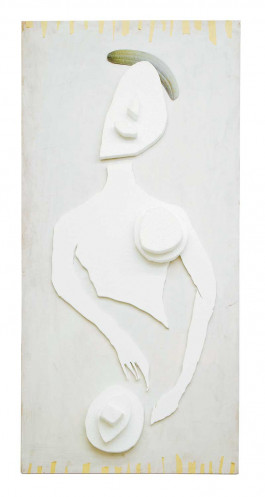
Two room installations in an exhibition following a travel grant to Papua New Guinea.
The installation Trophy Delight deals with various aspects of cargo cults.
A cargo cult is a political, religious movement from Melanesia. The believers live in expectation of the return of their ancestors through symbolic acts of substitution, which are supposed to bring Western goods with them. There were and are various cargo cults.
The cult has its roots in the encounter between Melanesians and Europeans, who brought new and supposedly miraculous cargo to previously isolated Melanesian cultures, and can be seen as a reaction to the sometimes radical social changes caused by missionization and colonial rule.
The occurrence was first observed and documented at the end of the 19th century. This phenomenon became particularly widespread in New Guinea during and after the Second World War. After initially mistaking the Europeans for the ancestors themselves, the indigenous population quickly realized that they were normal people, but much richer than themselves. They concluded that this wealth (the cargo) that had come from the Europeans was stolen from the land of the ancestors, who would come back to take revenge and hand over the cargo (firearms, cars, planes, etc.) to the indigenous people. In preparation for this event, they built replicas of port facilities, airfields or radio masts and partially destroyed their houses and plantations.
Verena Issel is rebuilding the replicas found in Papua New Guinea for Trophy Delight.
Issel created these replicas in various villages in Papua New Guinea while travelling there.
This public activity was an opportunity to talk to the local people.
In a next step, these discussions resulted in the installation Ethno Ethno.
The technical devices—televisions and DVD players—are disguised to appear “exotic” and alien. Interviews could be heard through the telephone receivers attached to the televisions.
In these interviews, two women’s rights activists from Papua New Guinea and Solomon Islands talk about the problems in their society, mostly caused by Western influence.
The two women’s rights activists interviewed here have different motives for their commitment to women. While Rose calls on the matrilineal women in her village to adopt a more traditional way of life in order to be able to stand up to the economically invading Chinese through a local trade boycott, Anthony indirectly attacks the Catholic Church and the missionaries. “The machismo and the mistreatment of women, all of this came to us in the matriarchy through the Western church.” Through their feminist commitment, both of them oppose influence from the West.
INGREDIENTS:
- Meet Rose
- Meet Anthony
- Backpackers Delight
- Tropical Delight (precious wood ice cream)
- Ohne Titel (Pantoffeltierchen)
- Banane II
- American Flag
- Migränegurke mit Abwehr (Cultural Resistance)
- Cargo: Wooden Radio
- Cargo: Remote Control
- Palme
- Landkarte (Papua-Neuguinea)
- Ohne Titel (Gelb)
- Banana
- Obstkorb
- Flugzeug
- Modern Apples
- Tomate
- Traube
- Nippel und Agave
- Apple No
- Ohne Titel (Von der Rolle)
- Manierismus heute: Da Sermoneta (Südseeschönheit)
- Ohne Titel (kleine Teile und Erdnüsse)
- Fresse, Mädchen!
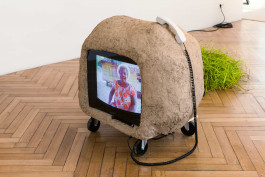
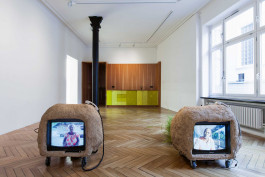
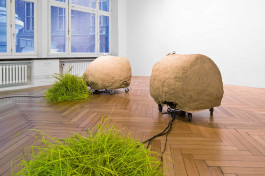
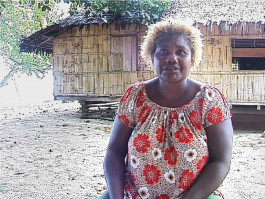
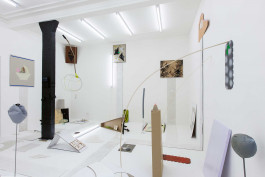
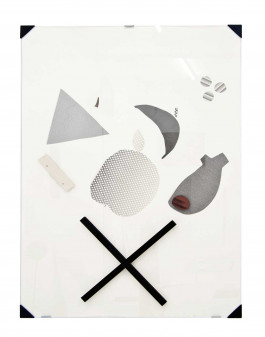
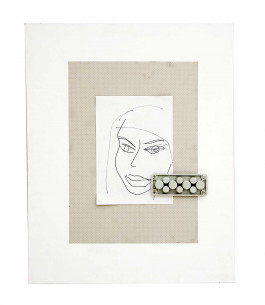

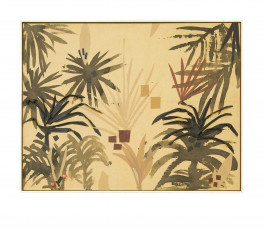
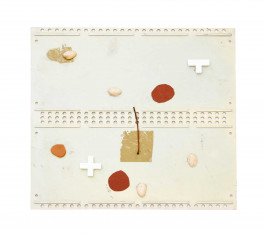
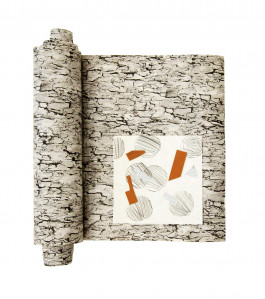
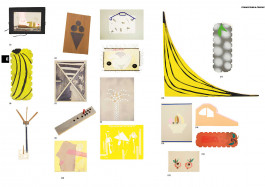
Ethno Ethno
2014, video installation, televisions covered in mud and clay, DVD players “camouflaged” with grass, phone receivers, video interviews with feminist activists from Papua New Guinea and Solomon Islands,
Installation view Galerie Dorothea Schlüter, Hamburg
Photo: Fred Dott, Hamburg
Ethno Ethno
2014, video installation, televisions covered in mud and clay, DVD players “camouflaged” with grass, phone receivers, video interviews with feminist activists from Papua New Guinea and Solomon Islands
videostills of
MEET ROSE (empowering women), 18 min., Mini-DV, interview with a women’s rights activist from New Ireland (Papua New Guinea)
and
MEET ANTHONY (empowering women), 15 min., Mini-DV, interview with a women’s rights activist from Choiseul (Solomon Islands), Installation view Galerie Dorothea Schlüter, Hamburg
Photo: Fred Dott, Hamburg
Ethno Ethno
2014, video installation, televisions covered in mud and clay, DVD players “camouflaged” with grass, phone receivers, video interviews with feminist activists from Papua New Guinea and Solomon Islands,
Installation view Galerie Dorothea Schlüter, Hamburg
Photo: Fred Dott, Hamburg
Trophy Delight, videostill of
MEET ROSE (empowering women),
18 min., Mini-DV, interview with a women’s rights activist from New Ireland (Papua New Guinea),
Installation view Galerie Dorothea Schlüter, Hamburg
Photo: Fred Dott, Hamburg
TROPHY DELIGHT
2014, various works and materials, dimensions of the room approx. 8 × 8 m,
Installation view
Galerie Dorothea Schlüter, Hamburg
Photo: Fred Dott, Hamburg
Apple No
2013, adhesive foil and wood on glass with plastic, 100 × 70 cm
Photo: Fred Dott, Hamburg
Fresse, Mädchen!
2013, felt-tip pen on paper with plastic and wood, 100 × 80 cm
Photo: Fred Dott, Hamburg
Manierismus heute: Da Sermoneta (Südseeschönheit)
2013, Styrofoam and cardboard on wood,
120 × 60 cm
Photo: Fred Dott, Hamburg
Nippel und Agave
2014, Stain and adhesive tape on wood,
68.5 × 86 cm
Photo: Fred Dott, Hamburg
Ohne Titel (kleine Teile und Erdnüsse)
2014, plastic, paper, peanuts on metal,
28 × 26.5 cm
Photo: Fred Dott, Hamburg
Ohne Titel (Von der Rolle)
2013, pencil and foam rubber on paper,
25 × 25 cm
Photo: Fred Dott, Hamburg
(7) Backpackers Delight
2010/2014, acrylic paint and metal on paper on cardboard, 34 × 45 cm
(8) Tropical Delight (precious wood ice cream)
2014, oak on mahogany with text marker, 80 × 50 cm
(9) Ohne Titel (Pantoffeltierchen)
2013, acrylic paint on paper with plastic, 50 × 70 cm
(10) Banane II
2013, acrylic paint on cardboard, 62 × 24.5 cm
(11) American Flag
2013, graphite on plastic, 21 × 16 cm
(12) Migränegurke mit Abwehr (Cultural Resistance)
2013, acrylic paint and plastic on paper, 70 × 100 cm
(13) Cargo: Wooden Radio
2014, acrylic paint on wood, 96 × 40 cm
(14) Cargo: Remote Control
2014, acrylic paint on wood, 20 × 4 cm
(15) Palme
2013, plastic and peanuts on plastic, 70 × 50 cm
(16) Landkarte (Papua-Neuguinea)
2014, acrylic paint and adhesive tape on canvas, 15 × 15 cm
(17) Ohne Titel (Gelb)
2013, paper and foil on plastic, 30.5 × 38 cm
(18) Banana
2013, acrylic paint on wood, 110 × 48 cm
(19) Obstkorb
2013, adhesive tape and plastic on cardboard, 100 × 80 cm
(20) Flugzeug
2013, adhesive tape on cardboard, 60 × 110 cm
(21) Modern Apples
2010/2013, acrylic paint and plastic on paper, 24 × 34 cm
(22)Tomate
2013, acrylic paint on cardboard, 62 × 24.5 cm
(23) Traube
2013, acrylic paint and spray paint on cardboard, 62 × 24.5 cm
all photos: Fred Dott, Hamburg